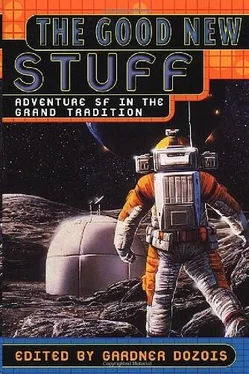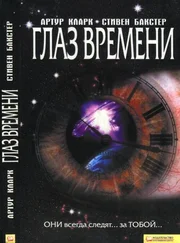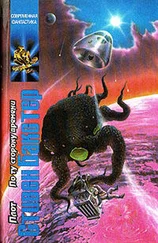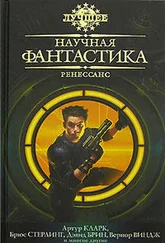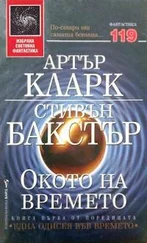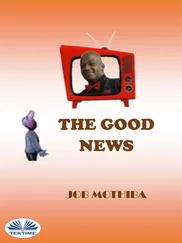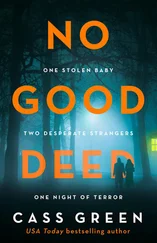Стивен Бакстер - The Good New Stuff
Здесь есть возможность читать онлайн «Стивен Бакстер - The Good New Stuff» весь текст электронной книги совершенно бесплатно (целиком полную версию без сокращений). В некоторых случаях можно слушать аудио, скачать через торрент в формате fb2 и присутствует краткое содержание. Год выпуска: 2002, ISBN: 2002, Издательство: St. Martin's Griffin, Жанр: Фантастика и фэнтези, на английском языке. Описание произведения, (предисловие) а так же отзывы посетителей доступны на портале библиотеки ЛибКат.
- Название:The Good New Stuff
- Автор:
- Издательство:St. Martin's Griffin
- Жанр:
- Год:2002
- ISBN:0-312-26456-9
- Рейтинг книги:3 / 5. Голосов: 1
-
Избранное:Добавить в избранное
- Отзывы:
-
Ваша оценка:
- 60
- 1
- 2
- 3
- 4
- 5
The Good New Stuff: краткое содержание, описание и аннотация
Предлагаем к чтению аннотацию, описание, краткое содержание или предисловие (зависит от того, что написал сам автор книги «The Good New Stuff»). Если вы не нашли необходимую информацию о книге — напишите в комментариях, мы постараемся отыскать её.
The Good New Stuff — читать онлайн бесплатно полную книгу (весь текст) целиком
Ниже представлен текст книги, разбитый по страницам. Система сохранения места последней прочитанной страницы, позволяет с удобством читать онлайн бесплатно книгу «The Good New Stuff», без необходимости каждый раз заново искать на чём Вы остановились. Поставьте закладку, и сможете в любой момент перейти на страницу, на которой закончили чтение.
Интервал:
Закладка:
It was hidden within a steep-sided crater, a castle or maze of crystal vanes that rose in serried ranks from deep roots within the crust, where they collected and focused tidal energy. He was at its heart, busily folding together a small spacecraft. The energy of the vanes had been greatly depleted by the fight, and he was trying to concentrate the remainder in the motor of the spacecraft. He was preparing to leave.
Her machines rose up and began to spin, locking in resonance with the vanes and bleeding off their store of energy. The machines began to glow as she bounded down the steep smooth slope towards the floor of the crater, red-hot, white-hot, as hot as the core of the sun, for that was where they were diverting the energy stored in the vanes.
Violet threads flicked up, but the machines simply absorbed that energy too. Their stark white light flooded the crater, bleaching the ranks of crystal vanes.
She walked through the traps and tricks of the defenses, pulled him from his fragile craft and took him up in a bubble of air to the neutral point between the Moon and the Earth.
"Tell me," she said. "Tell me why you came here. Tell me about the war."
He was surprisingly calm. He said, "I am a first generation clone, but I am on the side of humanity, not the transcendents. Transcendent clades are a danger to all of the variety within and between the civilizations in the Galaxy. At last the merely human races have risen against them. I am just one weapon in the greatest war ever fought."
"You are my flesh. You are of my clade."
"I am a secret agent. I was made from a single cell stolen from you several hundred years before you set off for this fake Earth and the gathering of your clade. I arrived only two years ago, grew my power source, came down to steal the memory core and kill you. Although I failed to kill you before, we are no longer in the place where you draw your power. Now—"
After a moment in which nothing happened, he screamed in frustration and despair. She pitied him. Pitied all those who had bent their lives to produce this poor vessel, this failed moment, although all the power, the intrigues and desperate schemes his presence implied were as remote from her as the politics of a termite nest.
She said, "Your power source is not destroyed, but my machines take all its energy. Why did your masters think us dangerous?"
"Because you would fill the Galaxy with your own kind. Because you would end human evolution. Because you will not accept that the Universe is greater than you can ever be. Because you refuse to die, and death is a necessary part of evolution."
She laughed. "Silly little man! Why would we accept limits? We are only doing what humanity has always done. We use science to master nature just as man-apes changed their way of thinking by making tools and using fire. Humanity has always striven to become more than it is, to grow spiritually and morally and intellectually, to go up to the edge and step over it."
For the first time in a million years, those sentiments did not taste of ashes. By trying to destroy her, he had shown her what her life was worth.
He said, "But you do not change. That is why you are so dangerous. You and the other clades of transhumans have stopped humanity evolving. You would fill the Galaxy with copies of a dozen individuals who are so scared of physical death that they will do any strange and terrible thing to themselves to survive."
He gestured at the blue-white globe that hung beneath their feet, small and vulnerable against the vast blackness between galaxies.
"Look at your Earth! Humanity left it four million years ago, yet you chose to recreate it for this gathering. You had a million years of human history on Earth to choose from, and four and a half billion years of the history of the planet itself, and yet almost half of your creation is given over to a single century."
"It is the century where we became what we are," she said, remembering Rapha. "It is the century when it became possible to become transhuman, when humanity made the first steps beyond the surface of a single planet."
"It is the century you were born in. You would freeze all history if you could, an eternity of the same thoughts thought by the same people. You deny all possibilities but your own self."
He drew himself up, defiant to the last. He said, "My ship will carry the memory core home without me. You take all, and give nothing. I give my life, and I give you this."
He held up something as complex and infolded as the throat of an orchid. It was a vacuum fluctuation, a hole in reality that when inflated would remove them from the Universe. She looked away at once— the image was already burned in her brain— and threw him into the core of the sun. He did not even have a chance to scream.
Alone in her bubble of air, she studied the wheel of the Galaxy, the ordered pattern of braids and clusters. Light was so slow. It took a hundred thousand years to cross from one edge of the Galaxy to the other. Had the war against her empire, and the empires of all the other transcendents, already ended? Had it already changed the Galaxy, stirred the stars into new patterns? She would not know until she returned, and that would take thirty-five thousand years.
But she did not have to return. In the other direction was the limitless Universe, a hundred billion galaxies. She hung there a long time, watching little smudges of ancient light resolve out of the darkness. Empires of stars wherever she looked, wonders without end.
We will fight the war, she thought, and we shall win, and we will go on forever and ever.
And went down, found the bar near the beach. She would wait until the old man came in, and buy him a drink, and talk to him about his dream of the lions.
Peter F. Hamilton
ESCAPE ROUTE
Prolific new British writer Peter F. Hamilton has sold to Interzone, In Dreams, New Worlds, Fears, and elsewhere. He sold his first novel, Mindstar Rising, in 1993, and quickly followed it up with two sequels, A Quantum Murder and The Nano Flower. Hamilton's first three books managed to slip into print without attracting a great deal of attention, on this side of the Atlantic, at least, but that changed dramatically with the publication of his next novel, The Reality Dysfunction, a huge modern Space Opera (it needed to be divided into two volumes for publication in the United States) that is itself only the start of a projected trilogy of staggering size and scope. The Reality Dysfunction has been attracting the reviews and the acclaim that his prior novels did not and has suddenly put Hamilton on the map as a writer to watch, perhaps a potential rival for writers such as Dan Simmons, Iain M. Banks, Paul J. McAuley, Gregory Benford, C. J. Cherryh, Stephen R. Donaldson, Colin Greenland, and other major players in the expanding subgenre of Modern Baroque Space Opera, an increasingly popular area these days. The second novel in the trilogy, The Neutronium Alchemist, is just out and generating the same kind of excited critical buzz. Upcoming is the third novel in the trilogy, The Naked God, and Hamilton's first collection, A Second Chance at Eden.
In the pyrotechnic novella that follows, one as packed with intriguing new ideas and fast-paced action and suspense as many another author's four-hundred-page novel, he unravels the mystery of an enigmatic object found in deep space, one that may prove to be harder— and considerably more dangerous— to get out of than it was to get in….
Marcus Calvert had never seen an asteroid cavern quite like Sonora's before; it was disorientating even for someone who had spent 30 years captaining a starship. The center of the gigantic rock had been hollowed out by mining machines, producing a cylindrical cavity twelve kilometers long, five in diameter. Usually, the floor would be covered in soil and planted with fruit trees and grass. In Sonora's case, the environmental engineers had simply flooded it. The result was a small freshwater sea that no matter where you were on it, you appeared to be at the bottom of a valley of water.
Читать дальшеИнтервал:
Закладка:
Похожие книги на «The Good New Stuff»
Представляем Вашему вниманию похожие книги на «The Good New Stuff» списком для выбора. Мы отобрали схожую по названию и смыслу литературу в надежде предоставить читателям больше вариантов отыскать новые, интересные, ещё непрочитанные произведения.
Обсуждение, отзывы о книге «The Good New Stuff» и просто собственные мнения читателей. Оставьте ваши комментарии, напишите, что Вы думаете о произведении, его смысле или главных героях. Укажите что конкретно понравилось, а что нет, и почему Вы так считаете.
